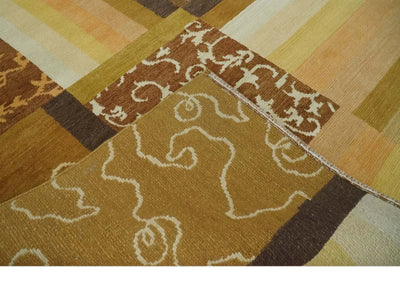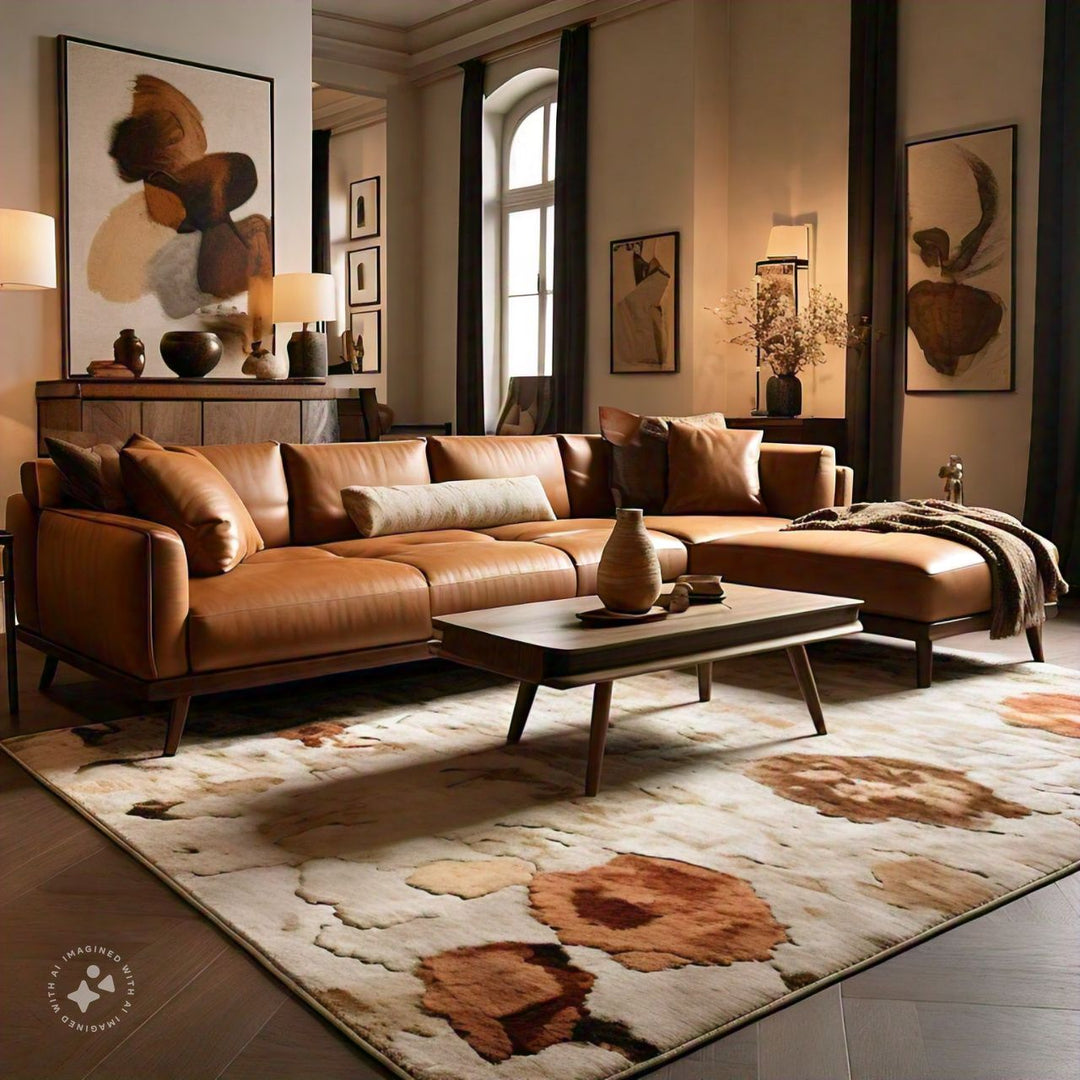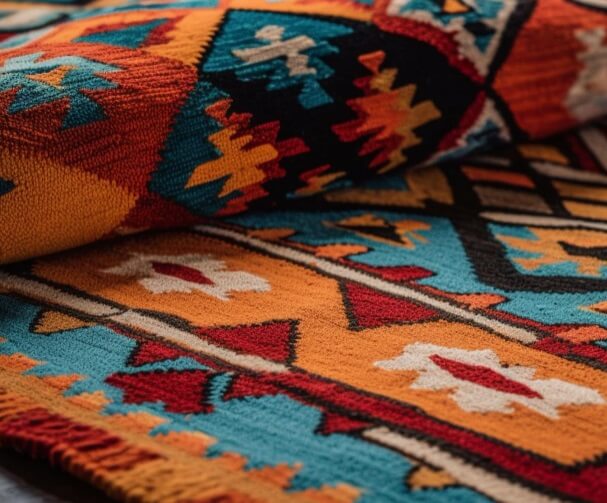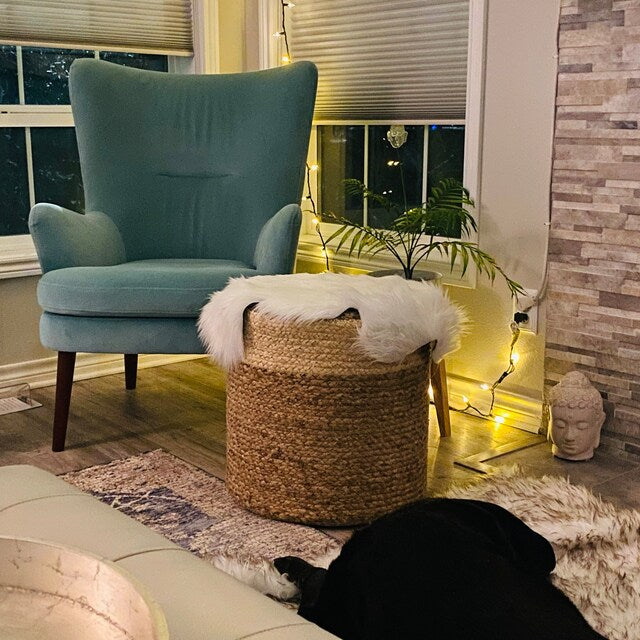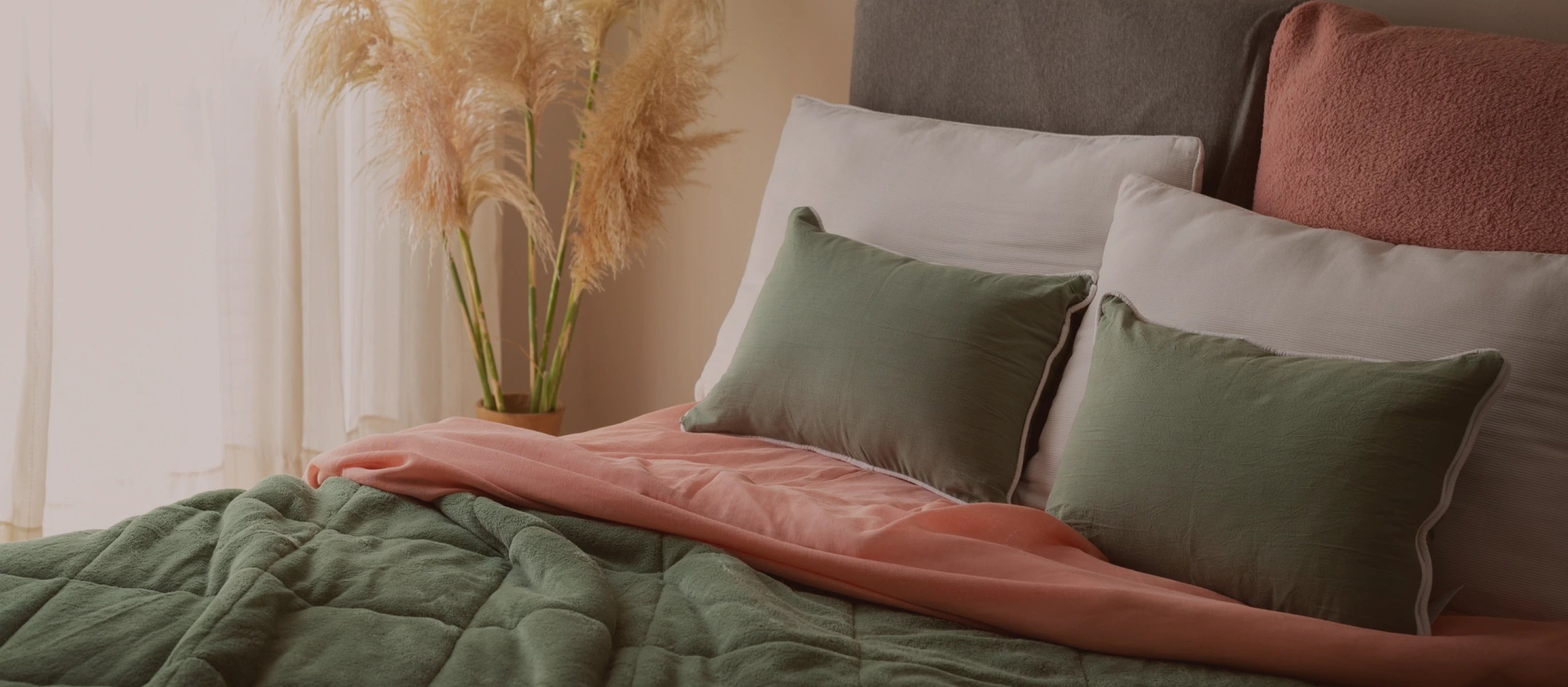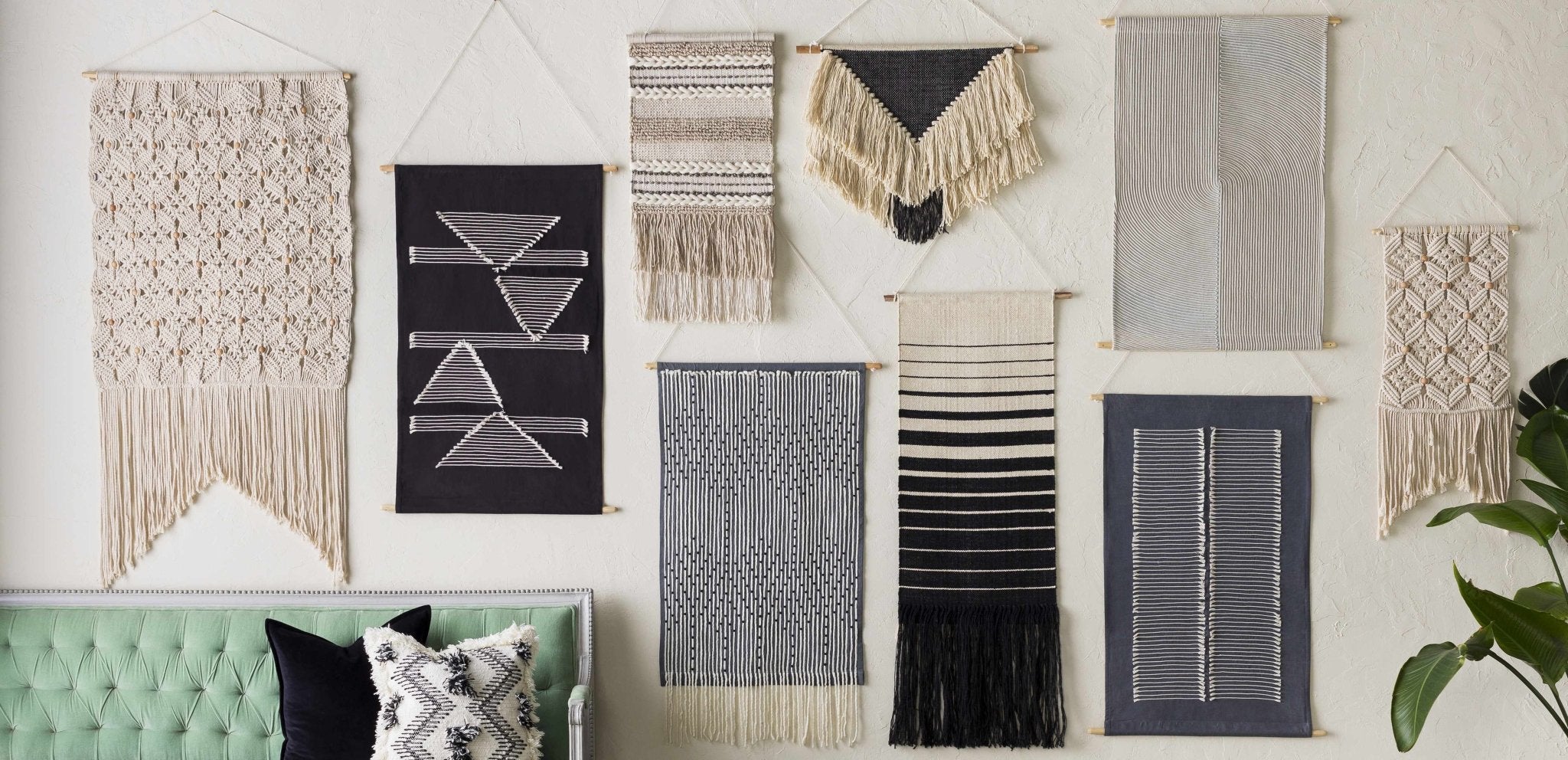Rug Size For Living Room - What Fits Best ?
Rug Size For Living Room
When it comes to designing a cozy and inviting living room, few elements can make as big of an impact as the right rug size and some effective living room placement ideas.
Similarly, selecting the right rug for your dining room is crucial in achieving both style and functionality. The right dining table rug can define the space, protect the flooring, and create a cohesive look that complements your dining area’s layout.
When selecting a rug for your living room, popular standard sizes include 5' x 8', 8' x 10', and 9' x 12'. These sizes are versatile and can define seating areas, add warmth, and complement the overall decor of your living space. The perfect rug can tie the room together, define focus areas, and add a touch of warmth and vibrance to your space.
In this blog post, we will explore various living room rug placement ideas and discuss the key factors to consider when choosing the size and placement of your rug. By understanding these considerations, you will be able to make the right decisions to transform your living area into a stylish and appealing space. So, let's dive into this living room rug placement guide and discover the secrets to achieving the perfect living room through smart selection and styling.
How to determine rug size for living room?
If you want to know how to place a rug in a living room, understanding the concept of right size is crucial. It is the primary aspect that enhances the overall aesthetics and functionality of the space. A rug that is too small can create a disbalanced look, while an oversized rug can overwhelm the room and make it appear congested. Therefore, having a proper living room rug size guide can help you to make the right choices.
The first step in achieving the ideal rug placement living room sectional is to determine the appropriate size for your living room. Consider the following factors:
Define the Seating Area
Identify the main seating area in your living room, which typically includes the sofa and chairs. Measure the dimensions of this area to determine the size of the rug required.
Consider dimensions
Think of the overall dimensions of your living room. If you have a larger space, you may opt for a larger rug to anchor the seating area and provide a cohesive look. In smaller rooms, a smaller rug can still add comfort and style without overwhelming the space.
Proportional balance
Ensure that the rug size is proportionate to the size of your furniture. A rug that is too small can make the furniture appear disconnected and out of place, while an oversized rug can dwarf the furniture and make the room feel crowded. Strive for a balanced and harmonious visual effect.
Living room rug placement
Apart from the right size, learning proper area rug placement living room is equally important. Properly positioning the rug in relation to the furniture can create a sense of balance and cohesiveness. The right placement can anchor the seating area, define pathways, and visually connect different elements within the room. It acts as a foundation that ties all the design elements together, giving the room a polished and well-thought-out appearance.
Once you have determined the size of the rug, you can explore different living room rug placement options based on your personal style and the layout of your living room.
All legs on
For a more formal and unified look, consider placing the rug in a way that accommodates all legs of the furniture. This arrangement creates a cozy and warm atmosphere, bringing all the elements together. It works well in larger living rooms where you want to create a sense of togetherness and connection.
Rug in the Image - Hand Knotted Blue Oushak
Also, allow ten to eighteen inches between the rug and the wall (or more if you have room). Going too near to the wall creates the appearance of an odd "almost" wall-to-wall carpet. The only exception is if you have your sofa up against a wall or a few inches away from one, or if your space is limited.
8x10, 9x12 and 10x14 depending on the space you have works well for this arrangement.
FRONT LEGS ON THE RUG
One popular area rug placement in small living room option is to have the front legs of the sofa and chairs resting on the rug while the back legs remain off. This placement style anchors the furniture, visually connecting it to the rug and defining the seating area. It provides a cohesive and inviting look while adding a touch of elegance to the room.

It better fits a tiny area, is more cost-effective, and may make a small space look larger. Only the front legs of your furniture (sofas and chairs) should be on the rug, while the rear legs should be on the bare floor.
The Rug in the image-Oriental Persian Area Rug
The idea is that the rug should only cover around one-third of the width of each piece of furniture. It unifies the seating area and offers a consistent effect without the additional cost of a room-sized rug.
Ideally 8x10 rugs are good fit for this arrangement.
The rug in the image- Vintage Hand-knotted Traditional Persian Heriz-Serapi Rug
THE FLOATING ARRANGEMENT (NO LEGS ON THE RUG)
In this placement style, the area rugs are positioned in the center of the seating area, with all furniture legs off the rug. This arrangement creates a more spacious and open feel, making it ideal for smaller living rooms. It adds a layer of comfort and style without overwhelming the space.

When done properly, the rug will appear intended and well-styled, filling the negative space created by the furniture grouping. For this pattern, a smaller rug size, such as a 6x9 or 5x8 rug, is ideal.
MAKE USE OF LAYERING RUG
If you want to use a 5x8 antique rug that compliments your living room décor but feels a little small? Not to worry, since you can stack this rug on top of a larger one. This layout may look stunning if you find the appropriate combo. Choose a natural jute rug as your huge foundation and layer a smaller rug on top, generally of a contrasting color and material.

Additional things to consider:
Traffic flow
Consider the traffic flow within your living room when determining rug placement. Ensure that the rug does not obstruct pathways or impede movement around the room. Keep in mind the placement of doors, windows, and other elements that may impact the flow of the space.
Balance with other elements
Take into account the balance between the rug and other elements in the room, such as artwork, coffee tables, and lighting fixtures. The rug should complement and enhance the overall aesthetic, creating a harmonious and visually appealing living room.
Personal style and preferences
Ultimately, your area rug placement in living room should reflect your personal style and preferences. Explore various options to find the perfect match for your home. Remember, rug placement is not just about functionality but also about creating an inviting and visually pleasing space that aligns with your taste.
Achieving the perfect living room rug placement is essential for creating a visually appealing and cohesive space. By considering the size of the rug against the furniture and exploring different placement options, you can transform your living room into a stylish and inviting haven.
Remember to consider room dimensions, proportional balance, traffic flow, and your personal style when making rug placement decisions. With careful consideration and attention to detail, you can create a living room that exudes comfort, style, and harmony.
Maintenance and care tips for living room rugs
Living room rugs not only add warmth and style to your space but also require regular maintenance and care to ensure their longevity and continued beauty. Proper maintenance practices can help protect your investment and keep your rugs looking fresh and vibrant for years to come. In this article, we will explore essential maintenance and care tips for living room rugs, helping you preserve their quality and appearance.
- Regular vacuuming- It is key to removing dust, dirt, and debris from your rug's fibers. Use a vacuum cleaner with a brush attachment and vacuum both sides of the rug.
- Rotate the rug- To ensure even exposure, rotate your living room rug every six months. This helps prevent uneven fading and extends the rug's lifespan.
- Spot cleaning- Accidents happen, and it's important to address spills and stains promptly. Start blotting the specific area with a paper towel or piece of clean cloth. Start from the outer boundary and go inwards. However, make sure you are not rubbing the stain as that can damage the fibers.
- Professional cleaning- While regular maintenance can keep your rug in good condition, professional cleaning is recommended every 12 to 18 months, depending on usage. Professional cleaners have the expertise and equipment to deep clean and remove embedded dirt, allergens, and odors without damaging the rug's fibers.
- Protect from sunlight- Direct sunlight can cause fading and discoloration of your living room rug. Protect it by using window treatments such as blinds or curtains to reduce exposure to UV rays.
- Use rug pads- Invest in high-quality rug pads that provide cushioning and prevent slipping. Rug pads also protect your floor and extend the life of your rug by reducing friction and wear.
- Gentle rug beating- Periodically take your rug outside and gently beat it to remove embedded dirt and dust. Hang it over a sturdy rail or clothesline and use a soft broom or rug beater to lightly strike the rug.
To ensure you pick the right size, use a comprehensive dining room rug size guide. This guide helps you find a rug that fits under both your dining table and chairs
Explore
Bedroom Rug Size
Kitchen Rug Size
FAQs
What is the ideal rug placement in the living room?
The ideal rug placement in the living room involves placing it under the front legs of sofas and chairs, creating a cohesive and anchored look. This arrangement helps define the seating area and provides a visual balance.
How do I determine the right size rug for the living room?
To determine the right size rug for your living room, measure the seating area and choose a rug that allows all furniture legs to fit comfortably on it. Leave about 12-18 inches of floor space around the rug's edges for a balanced and proportionate appearance.
Is 5x7 rug too small for living room?
A 5x7 rug might be too small for a living room, particularly if you have larger furniture pieces. This rug size is better suited for smaller spaces like an entryway or a compact seating area.
What is the most popular rug size for living room?
The most popular rug sizes for living rooms are typically 8x10 or 9x12. These larger sizes offer ample coverage for seating areas and help define the space, making them a popular choice.






